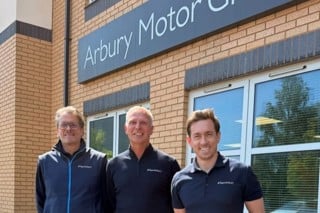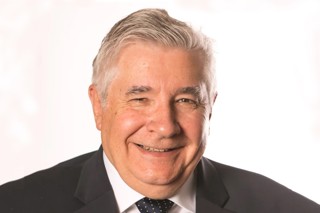First impressions are important in the motor trade. A good one can mean the difference between a customer parting with a considerable amount of cash and walking away to the competition.
First impressions are important in the motor trade. A good one can mean the difference between a customer parting with a considerable amount of cash and walking away to the competition.
First impressions are important in the motor trade. A good one can mean the difference between a customer parting with a considerable amount of cash and walking away to the competition.
First impressions are important in the motor trade. A good one can mean the difference between a customer parting with a considerable amount of cash and walking away to the competition.
It took just seconds before Arbury owner and managing director David Stenning was chatting to AM’s photographer about his passion for taking pictures of wild animals, going into technical detail about lenses and Canon vs Nikon.
Arbury Motor Group
Turnover £70.1m (2012) |
|
Franchise representation |
|
 |
|
| Peugeot (5) | |
 |
|
|
Citroën sales (1) |
|
|
|
|
| Škoda (1) | |
|
|
|
| NIssan (1) | |
 |
|
| Fiat (1) | |
|
|
|
 |
|
| Arbury is the cover story in the current issue of AM magazine. Click here to subscribe | |
Finance director Neil Barrett instantly volunteered to stick the kettle on. There is no receptionist – the pair both prefer to manage their own calls and visitors. It made an instant impression about how they do business.
Arbury keeps a very flat structure at the top, with the new head office space being used by Stenning, Barrett and marketing manager Leigh Franklin. The space is also used for training and there’s room downstairs for Arbury’s dedicated fleet department (see ‘The fleet opportunity’, on the facing page).
It’s the first time the management team has not been based on-site at a dealership and marks the next step in the group’s evolution from a single-site business with Peugeot, to a seven-site group.
The group’s lead franchise is Peugeot, with five showrooms, but it also represents Nissan, Škoda, Citroën and Fiat at locations across Bromsgrove, Leamington Spa, Lichfield, Nuneaton and Walsall.
Stenning has been in the motor trade since he left school. Trained by Ford in vehicle design, he worked for six years sketching new truck designs in South Africa (also a great opportunity to get snaps of lions and birds of prey).
His return to the UK brought him to Currie Motors and his first retail job was parts and marketing manager at the company’s Twickenham site. Like many current dealer group owners, Stenning worked through all the departments of the business, from truck sales, to car sales, service and then general management.
“I’ve worked in all departments so I instantly know when a manager isn’t being honest about the situation,” he said.
Barrett started out with Ernst & Young in Birmingham, and said he stumbled upon the motor industry as a dealership accountant with Evans Halshaw in Solihull, but admits the variety motivates him more than the company audits.
“The motor trade provides such an interesting and wide sort of environment. We’re retailers; we’re wholesalers, warehouse distribution with the parts business,” he said.
“It’s customer-focused and it’s so much more than just producing the numbers.”
Barrett met Stenning at Evans Halshaw, where he was working as a regional director. Peugeot approached Stenning about starting something on his own when he had moved to work with a Ford business at Pendragon.
Barrett had also moved on, starting a job at Quicks following Pendragon’s acquisition of Evans Halshaw.
Stenning started working on his first acquisition with Peugeot in 2000 and Barrett went with him.
“We acquired a Peugeot dealership in Nuneaton and haven’t looked back really,” said Barrett.
Stenning describes the Nuneaton site as a “raging success” for Peugeot, with the dealership ranking in the top two positions in the UK for customer satisfaction ratings. ![]()
Group turnover was £70 million in 2012 and the business expects to hit £80m in 2013. A lot of that comes down to the new car market – the group’s new car sales are up significantly this year. It sold 3,200 new vehicles last year and was already at the 3,000-unit mark in October.
THE FLEET OPPORTUNITY |
|||
|
One of the biggest changes Arbury has introduced in the past 12 months has been to grow its fleet business. David Stenning said if the business was going to continue being successful, it needed to be operating in every market channel. “We were only going to do it once we found the right person to run it. We found that person, who was employed within the company, and we’ve grown really from nothing in fleet to 500 units in two years from 100 local businesses. “Half of the market is fleet and we knew the models coming through with the brands we represent would work well with fleet customers. “You can’t afford to not be in half the market.” Arbury has a team of three building fleet business and plans to increase it to six people next year. Arbury’s long-term goal is to increase fleet volumes across all brands to a total 4,000 units a year. |
|||
Stenning acknowledges that the market is strong, with used cars also up 10% and used car margins up 12%.
Every site is profitable and has been for the past few years. Arbury’s top Peugeot site is delivering 4% return on sales, well above the industry average of 1.3%.
What’s behind that level of return? Stenning puts it down to the group’s focus on people. Staff turnover is under 20% and management turnover is at less than 5%. It has never lost a general manager.
Staff have bought in to Arbury’s customer service approach, which has resulted in 98.6% of customers recommending the group’s dealerships to friends and family this year.
Three of Arbury’s dealerships won in Peugeot’s Guild of Gold Lion awards last year. Stenning wants to take all five top spots this year. The dealerships are currently placed in 2nd, 3rd, 4th, 5th and 18th.
Stenning said: “Performing well in the guild is really important to us. It’s not only what we do financially, it’s how we do it and the standards, our own internal standards rather than manufacturer standards.
“We don’t really look at manufacturer composites because who aspires to be average?”
It’s all about the team
Stenning puts the good customer service scores and
financial results down to the teams across the group: “Everyone says it, but we do operate as a team. We’ve got a great team of managers, we discuss things as a team, and we have a monthly operations meeting which everyone gets involved with.”
There are no operations managers and communication in person or on the phone is preferred over email.
One of the biggest problems facing the industry is finding the right people. Stenning admits it’s one of the most difficult parts of running a successful group.
“Two of our good general managers started with us as salesmen, another started as a body shop manager,” he said. “So they’ve come from within. If you find the right people, you look after them, you treat them properly, pay them well and talk to them.”![]()
Skills can be taught and so can business acumen, but attitude is the group’s key for recruitment success.
It ran two recruitment events across four days this year and advertised on local radio and targeted people that work in hotels and at Birmingham Airport.
SMART REPAIRS |
|||
|
SMART repairs was another area the group realised needed to be addressed. Stenning said many dealerships don’t realise how much they spend outsourcing the repairs: “We were spending £100,000 a year on somebody else coming in to do minor repairs on our cars, which we were quite capable of doing ourselves.” Arbury now employs two mobile SMART repair operatives, each with their own van, who fix scuffs, paint and wheels across the group. As well as car preparation and retouching used car stock, Arbury markets SMART repairs to retail customers. Barrett said: “We have turned what was a cost centre into a profit centre for the group and we feel we can develop it further.” |
|||
The recruitment days resulted in interviews for customer advisers, sales executives, services managers and sales managers. Four current managers from across the group interviewed the candidates, a method that Stenning prefers to going out to recruitment agencies. Arbury uses an aftersales manager to interview for aftersales roles.
The group doesn’t do psychometric testing. Stenning believes first impressions count and said his managers will know if a candidate’s character is right for the role and the group within 10 minutes.
The recent recruitment drive has been due to the growth Arbury has seen with Nissan. The group started its second site with the Japanese franchise on September 1 and its Škoda business relocated in June, so both needed staff.
Retail is detail
“I think one of the successes or one of the reasons for the success of our business comes down to our attention to detail,” said Barrett. “We produce very, very detailed management accounts [comparing] dealership to dealership. A lot of it comes down to David and his ability to have this incredible attention to detail.
“We can look at each site and pick up on the problems that people walk past.”
Barrett produces site comparisons and benchmarking reports.
“For us to be able to benchmark internally, against what are all fairly decently performing businesses, pushes us forward more than to try and benchmark against manufacturer composite,” he said.
Arbury’s approach is to blend the professionalism and processes of a plc with the softer skills of a family-owned business.
Staff are rewarded through quarterly incentives, in addition to commission packages. Half is paid on customer satisfaction and the other half is paid upon achieving budget.
Relationship with Peugeot
While the group is growing with other brands, Peugeot is a major partner.
The French brand has seen its market share eroded over the past 10 years, going from a 200,000-unit franchise to 100,000 units in 2012. Arbury joined the brand at its peak at the turn of the millennium and has enjoyed a strong relationship since.
Stenning said Peugeot gets a bad press in the UK: “Like all brands, you have to learn how to make a profit. We make excellent returns out of Peugeot, the cars are fantastic. If you look at the range, we have no warranty issues and I think the brand is really undersold in the UK.”![]()
Stenning chairs a dealer sales and marketing committee with Peugeot and if he thinks there’s a problem, he will tell them outright. Peugeot has dealer sub-committees on the dealer councils for aftersales and sales. Dealers tend to have conference calls and working meetings about the franchise, rather than large forum meetings, which Stenning believes are less effective.
FIGHTING BACK AGAINST THE FAST FIT PRICE CLAIMS |
|||
|
Seeing fast fits continue to market themselves to UK consumers as 40% cheaper than a main dealer is a particular point of frustration for David Stenning. “Apart from using [non-OE] parts, the wrong oil, the wrong training, the wrong equipment, they don’t have the software, can’t do software downloads, can’t do warranty, have no goodwill process, don’t do delivery and collection, don’t clean the car, don’t provide keys to a brand new courtesy car.
“Apart from the fact that your car is worth Stenning believes those reasons need to be highlighted more clearly to consumers and he wants the franchised dealer industry to get better at promoting itself. “Some independents promote that they provide main dealer levels of service, but it’s complete rubbish. They don’t and cannot,” he said.
Stenning believes franchised dealers are undercharging based on the service and skills required: “I had my chainsaw serviced last week. It was £83. One spark plug, no brakes, “It costs me almost as much to have my chainsaw serviced as we’re expected to service a car for – £99.” Stenning believes the view that the franchised dealer is not competitive on pricing is reinforced by fast fit advertising, consumer magazines and a lack of understanding of the complexities involved in servicing a car. |
|||
Arbury puts a lot of focus on new cars and this approach works well for Peugeot. “You have to learn how to make money on the brand and it’s always been that way,” said Stenning.
“If you go back 30 years, you hit your new car targets and you make money; you don’t hit your new car targets, you don’t make money. We make more on a new car than we do off a used car so why wouldn’t we sell new cars?
“The customer comes back in two years’ time and buys another car, and he has his car serviced.”
While Arbury has a strong relationship with Peugeot, Stenning and Barrett made the decision to further balance its portfolio with more brands across the group.
Arbury is looking to expand further with Nissan and Škoda in the future.
PCPs driving growth
Many in the industry have cited personal contract purchases (PCPs) as the key to the consistent growth in new car sales for almost two years. They have been a consistent contributor to Arbury’s success with new car sales.
The product has been around for years but it is only now that the majority of manufacturers are really pushing it as a lead product in their marketing. Arbury and particularly Peugeot have been aware of the merits of PCP for many years.
Stenning said: “We are heavily into PCP and we are now running at 70% penetration on new cars with it across the group. Finance penetration overall is at 76%.
“Peugeot is really strong on PCP; they are probably recognised as being one of the market leaders and they were into it in the very early days.”
Stenning said staff at Arbury’s Peugeot sites are probably more aware of what the monthly payments are on a new car than they are of the cash prices.
Making a success of PCPs requires a cultural change within the dealership, because the customer doesn’t own the car. However, the strength of the deal is usually enough to persuade people.
“If you look at the Peugeot offer currently, with three years’ insurance, three years’ roadside assistance, three years’ warranty, three years’ road fund licence – it’s a phenomenal offer,” Stenning said.
“There’s a belief in the product from staff and like any offer a business is putting forward to customers, if it’s a product staff can believe in, it makes it much easier to sell the benefits to a customer.”
Arbury’s focus on new car sales means the business does generate a lot of part-exchanges. Its high penetration with PCP means the business is getting a lot of two-and-a-half-year-old vehicles back in stock to sell as used.
The group also took the decision several years ago to sell non-franchise cars and has also expanded its used car stock to include higher mileage vehicles. This means Arbury can compete with a wider variety of customers at different budget levels. The business was operating at a £5,000 entry price on its used cars and it was cutting off too much of the second-hand buyer market.
Arbury does not tend to use auctions to source stock, although it will dispose of cars at auction. The majority of its used car stock is from part-exchanges and from manufacturers’ used car programmes.
Aftersales is more of a challenge and is where Stenning believes dealers are feeling the most pressure, particularly with French and non-German brands. ASE currently has its overhead absorption rate benchmark at 80%.
Arbury’s overhead absorption figures are just under 60% and Stenning believes this level is the new norm, with dealerships across the industry working hard to stay there.
Arbury uses its own call centre to manage servicing enquiries and to keep in contact with customers. It opened the centre three years ago and six full-time staff are now dedicated to keeping in touch with customers. They make all outgoing calls for the group and take some inbound enquiries too. Barrett believes this gives the group a consistent process across sites.![]()
Service plans fundamental to the future
Stenning admits the group was a little late to market with service plans but said the product is now fundamental to the future of its service departments. Conversion rates from service plan quotes to customers is at 20% and the business wants to push this further. Arbury has found that once service plans have been explained properly, the second service plan is always a much easier sell.
“Service plans and the support of the manufacturer campaigns are key elements of selling a car now,” said Stenning.
“Our service departments are up in retail hours, they’re up in overall hours and revenue, so we’re making progress.”
The biggest change for the business this year will be moving from its current dealer management system to ADP across all of its sites.
The group researched the market and the different systems thoroughly for more than six months before choosing ADP.
“We’ve been and seen the systems working,” said Stenning.
“We’ve had the involvement of our own managers, so it has been a team decision.”
The group expects to limit disruption within the business by training all staff before the new system goes live.
Arbury expects the major benefits of ADP will be integration of systems and databases across the group. The management team is planning to run the business manually for two days, while the switchover takes place.
Acquisitions and further growth
Arbury is likely to grow to become a bigger regional player in the future, but the process will be controlled.
“We’re not reckless,” said Stenning. “We will not make any acquisition that will put the rest of the group at risk and it has to fit with our strategy. It has to fit with our market area plan.
“If we see a site which we consider as an underperforming business in a market which we feel we can make some money out of, then we look at it. We have had several offers for us to take on businesses this year.”
Stenning believes it takes at least a year to fully understand how a new franchise works, how the bonus schemes are structured, fully working out the quirks and opportunities within the brand.
He said: “We’ll carry on growing organically, but we’re not on a mission to hit 20 sites by a specific date.
“It’s about taking advantage of opportunities that come up and there are still, even in the 21st century, lots of businesses that are underperforming and still operating like they’re in the 20th century.”
Login to continue reading
Or register with AM-online to keep up to date with the latest UK automotive retail industry news and insight.




















Login to comment
Comments
No comments have been made yet.